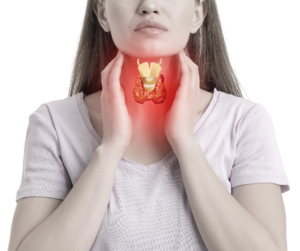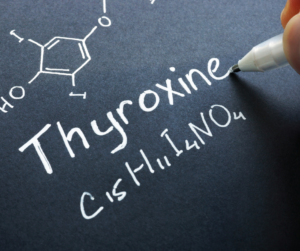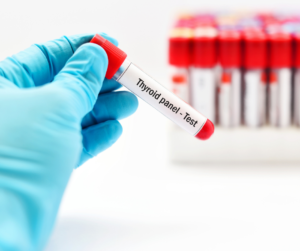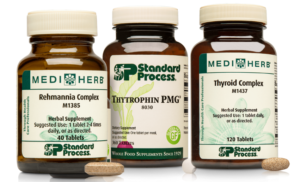By Claire Bacon, ACN, CNC
Does it seem like autoimmune thyroid disease is more common than ever before? That’s because it is. It seems like every one of us has a female friend who is struggling to get her thyroid under control. That’s because autoimmune thyroid disease is the most prevalent organ-specific autoimmune condition. Out of 80 known autoimmune conditions, autoimmunity in the thyroid affects approximately 2 – 5% of the population – and 85% of cases occur in women. Graves’ Disease and Hashimoto’s Thyroiditis are the major causes of hypothyroidism and hyperthyroidism, respectively.
The biggest problem we see with these conditions is that people often don’t know they have them. They know they’re exhausted, they know their hair is falling out, they know their weight is changing dramatically, but their doctor says they’re fine. Why is that? Because there are a lot of medical professionals out there who don’t run all the right tests, and don’t spend enough time educating the patient. As a result, the patient misses out on all the beneficial things she could do with her diet and supplementation in order to feel better.
What is Autoimmunity?
Autoimmunity is when one or more of the organs or tissues in your body is being attacked by your own immune system’s cells. Autoimmune conditions occur when your immune cells identify your own tissues as a foreign pathogen that needs to be attacked and killed.
When this attack happens, it causes inflammation and heightened immune response. Chronic inflammation can cause a whole host of symptoms that snowball until you feel like you’re falling apart. Having an internal environment that has allowed one autoimmune condition can over time eventually cause multiple autoimmune conditions.
The goal of healing autoimmunity is to find the root cause of the inflammation and put out the inflammatory fire. We like to say that “all autoimmunity begins in the gut.” Certainly, getting your gut environment healthier can have profound benefits to improving your symptoms and how you feel.

Physiology of the Autoimmune Condition
The destruction of thyroid cells in autoimmune conditions may be caused by multiple mechanisms, including auto reactive T-lymphocytes, natural killer cells, and cytokines. There appears to be a deficiency in the immune regulation, between the effector T cells and regulatory T cells. In other words, dysregulation of the cytokine messengers that communicate the roles of different immune cells can be instrumental in the development of autoimmunity.
Have you ever heard of the Th1 and Th2 pathways? These pathways consist of different cytokines. Th1 consists of T-Helper cells which include the cytokines IL-2, IFN-γ, and tumor necrosis factor-α (TNF-α). Th2 consists of B cells, and is characterized by the secretion of Interleukins IL-4, IL-5, IL-6, IL-10, and IL-13. Hashimoto’s thyroiditis is typically known as a Th1-dominant condition. Graves’ Disease is thought to be a Th2-dominant autoimmune condition. However, not every case follows this pattern. Nothing in health is ever cookie-cutter!
How Can Lifestyle Trigger Thyroid Autoimmunity?
Part of the problem with identifying autoimmunity is that it may appear different in different people, and may be caused by different reasons. It’s definitely not a cookie-cutter diagnosis. You have to take the full history into consideration, run the right tests, and also use some thought process. Do the test results match what the patient is feeling?
A wide variety of common exposures and situations can trigger autoimmunity, because of the way they affect the function of the gut lining. These may include:
- Viruses, like Epstein-Barre or mononucleosis,
- Other infections, like cellulitis or food poisoning,
- pregnancy,
- vaccines,
- chronic use of OTC medications,
- lack of iodine in the diet,
- chemical toxicity or exposures in the home or workplace,
- impaired liver function,
- antibiotics,
- gluten and other food sensitivities, as well as sugar,
- stress, and/or
- basically anything you could imagine that can disrupt your gut health.
Clearly, we want to minimize all of these items to minimize our chances of developing autoimmunity at some point in life.
What does the thyroid do, anyway?

Thyroid hormones control how your body uses energy, so they affect nearly every organ in your body—even the way your heart beats. When you have a thyroid problem, the first thing you notice is lack of energy or stamina. Because the thyroid is so integral with many other body processes, leaving autoimmunity unresolved can manifest in widespread and worsening symptoms. These may include:
- high cholesterol,
- heart disease,
- kidney disease,
- high blood pressure, and/or
- myxedema, a rare condition in which the body’s functions slow down to the point that it can threaten your life.
Typical Symptoms
When you have an autoimmune thyroid condition, you could experience symptoms of either hypothyroid (under-functioning) or hyperthyroid (over-functioning). Typically, the hypothyroid person will experience weight gain (especially after eating a food sensitivity), dull skin and hair, foggy thinking, and perhaps hair thinning or falling out. A hyperthyroid person may find it hard to keep weight on, have a racing heartbeat, and extraordinary anxiety. In both cases, they may feel exhausted, confused, frustrated and miserable.
How can I figure out if I have thyroid autoimmunity?
First off, you want to run the right blood tests. Checking Thyroid Stimulating Hormone (TSH) alone is insufficient. Looking at Thyroxine (T4) and Triiodothyronine (T3) gives a little more information, but still doesn’t tell the whole story. You must order Thyroid Peroxidase (TPO) and Thyroglobulin (Tg) antibodies. If positive for these, you must take additional steps to bring the inflammation down and normalize the immune system.
If needed, you can go deeper with testing to identify whether it’s Hashimoto’s thyroiditis or Graves’ disease. In these cases, genetics can influence your risk of developing autoimmunity. The HLA genes, in particular, are of major importance. Your doctor could order HLA tests, TSH Receptor antibodies, Thyroglobulin, or Calcitonin to define your condition. You could also test the cytokines to determine if you are in a state of Th1 or Th2 dominance. However, for nutritional and wellness purposes, the TPO and Tg antibodies are sufficient for us.

How can changing my diet help?
Once you see thyroid antibodies are positive, you know you have to be more hard core about your diet. Stop with the “moderation”. You’ll need to follow the Autoimmune Protocol (AIP) diet to reduce inflammation and rebalance the immune system.
The most important foods to avoid are wheat, other grains with gluten, and dairy. However, you can’t just stop there. Other inflammatory triggers include: corn; soy; chocolate; legumes like lentils, peanuts and chickpeas; nuts and seeds; and nightshades like eggplant, bell peppers, potatoes, and tomatoes. And of course, sugar! Sugar can mess up any kind of gut condition. It doesn’t do anyone any favors!
So, what can you eat? At first, it may feel like nothing is left. But really, you still have the entire meat and seafood section of the store at your disposal. And there are plenty of lettuces and green vegetables to choose from. If you’re feeling overwhelmed, I recommend starting here: Resources | A Squirrel in the Kitchen and be sure to order the book, “The Autoimmune Protocol Made Simple” by Sophie van Tiggelen.
Are there supplements that can help?

Yes, of course! Don’t forget – Nature has given us everything we need to be healthy. We just need to tap into it! A few of our favorites…
- Rehmannia Complex – is an herbal blend of Rehmannia, Bupleurum, and Feverfew, but the most important part is that it contains Hemidesmus. The Hemidesmus herb is known to dampen the autoimmune attack against the thyroid. Available in office only.
- Echinacea Premium – for balancing the Th1 and Th2 sides of the immune system. Just a little bit over a long period of time works best to normalize the immune cells.
- Thytrophin PMG – is a thyroid extract that has been processed to remove its thyroxine (T4). It acts as a decoy to distract the immune system away from the thyroid, so the tissue can heal. Can be used when symptoms are either “hyper” or “hypo.”
- Thyroid Complex – is a natural source of iodine from Bladderwrack, but also contains Ashwagandha and Bacopa to support normal thyroid function, generally when it has been under-functioning.
Of course, there are many other choices. Because our goal is to heal the gut lining and improve gut barrier permeability, we will also need to incorporate essential fatty acids (like Cod Liver Oil), non-dairy probiotics, vitamin A and other important minerals. The best combination of course depends on the person’s bio-individuality.
Can essential oils help?
Absolutely! Frankincense, Clove, Lemongrass, Myrrh, Lavender, Peppermint, and Tea Tree are all popular oils with research that shows benefits to stress, fatigue, and other symptoms that coexist with thyroid conditions. You may like to make your own DIY perfume using a few drops of each of these oils. You can get more ideas here… 7 Best Essential Oils for Thyroid Health with Dr. Mariza (drmariza.com)
If you’re just getting started with essential oils, let us know if you need help. We have many oils on hand at the office, and can give you some pointers with trying these out.

Final Thoughts
We have mentioned our favorite strategies to get you feeling better when we know autoimmunity is involved. The key is always reducing inflammation. If you can pay attention to how your body feels in response to a particular food or herb, you’ll be well on your way to success. Understanding your own bio-individuality is absolutely paramount!


